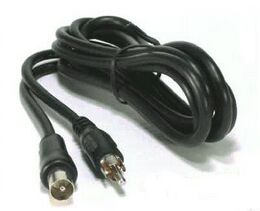Difference between revisions of "RF connector"
From Retro CDN
Ccawley2011 (talk | contribs) |
|||
| (3 intermediate revisions by 3 users not shown) | |||
| Line 2: | Line 2: | ||
A '''radio frequency connector''' is an electrical connector designed to work at radio frequencies. RF connectors are commonly used to connect video game consoles to television sets, and are also used for TV aerials. There are many different types, though Sega consoles have typically used the IEC 169-2 standard where possible. | A '''radio frequency connector''' is an electrical connector designed to work at radio frequencies. RF connectors are commonly used to connect video game consoles to television sets, and are also used for TV aerials. There are many different types, though Sega consoles have typically used the IEC 169-2 standard where possible. | ||
| − | Linking a console to a television via RF cables is usually the worst method that can be chosen, however older consoles such as the [[Sega Master System]] and [[Sega Mega Drive]] offer no other alternatives without modifying the hardware. This is because typically consoles give out [[composite video]] signals, which, if RF connectors are used, is then converted into an RF signal and converted back by the time it reaches the TV. These conversions and the nature of the technology create a lot of noise, resulting in poorer quality picture and sound than newer formats. | + | Linking a console to a television via RF cables is usually the worst method that can be chosen, however older consoles such as the [[sega:Sega Master System|Sega Master System]] and [[sega:Sega Mega Drive|Sega Mega Drive]] offer no other alternatives without modifying the hardware. This is because typically consoles give out [[composite video]] signals, which, if RF connectors are used, is then converted into an RF signal and converted back by the time it reaches the TV. These conversions and the nature of the technology create a lot of noise, resulting in poorer quality picture and sound than newer formats. |
| − | Newer machines typically fall back on [[ | + | Newer machines typically fall back on [[RCA jack|RCA connectors]] as the "default", though there are other alternatives such as [[S-Video]] and more recently, HDMI. |
| − | RF is an option for all Sega consoles up to and including the [[Sega Dreamcast]]. | + | RF is an option for all Sega consoles up to and including the [[sega:Sega Dreamcast|Sega Dreamcast]]. |
==See also== | ==See also== | ||
| Line 13: | Line 13: | ||
*[[SCART]] | *[[SCART]] | ||
| − | [[Category:Television | + | [[Category:Television information]] |
Latest revision as of 14:38, 19 July 2016
A radio frequency connector is an electrical connector designed to work at radio frequencies. RF connectors are commonly used to connect video game consoles to television sets, and are also used for TV aerials. There are many different types, though Sega consoles have typically used the IEC 169-2 standard where possible.
Linking a console to a television via RF cables is usually the worst method that can be chosen, however older consoles such as the Sega Master System and Sega Mega Drive offer no other alternatives without modifying the hardware. This is because typically consoles give out composite video signals, which, if RF connectors are used, is then converted into an RF signal and converted back by the time it reaches the TV. These conversions and the nature of the technology create a lot of noise, resulting in poorer quality picture and sound than newer formats.
Newer machines typically fall back on RCA connectors as the "default", though there are other alternatives such as S-Video and more recently, HDMI.
RF is an option for all Sega consoles up to and including the Sega Dreamcast.
